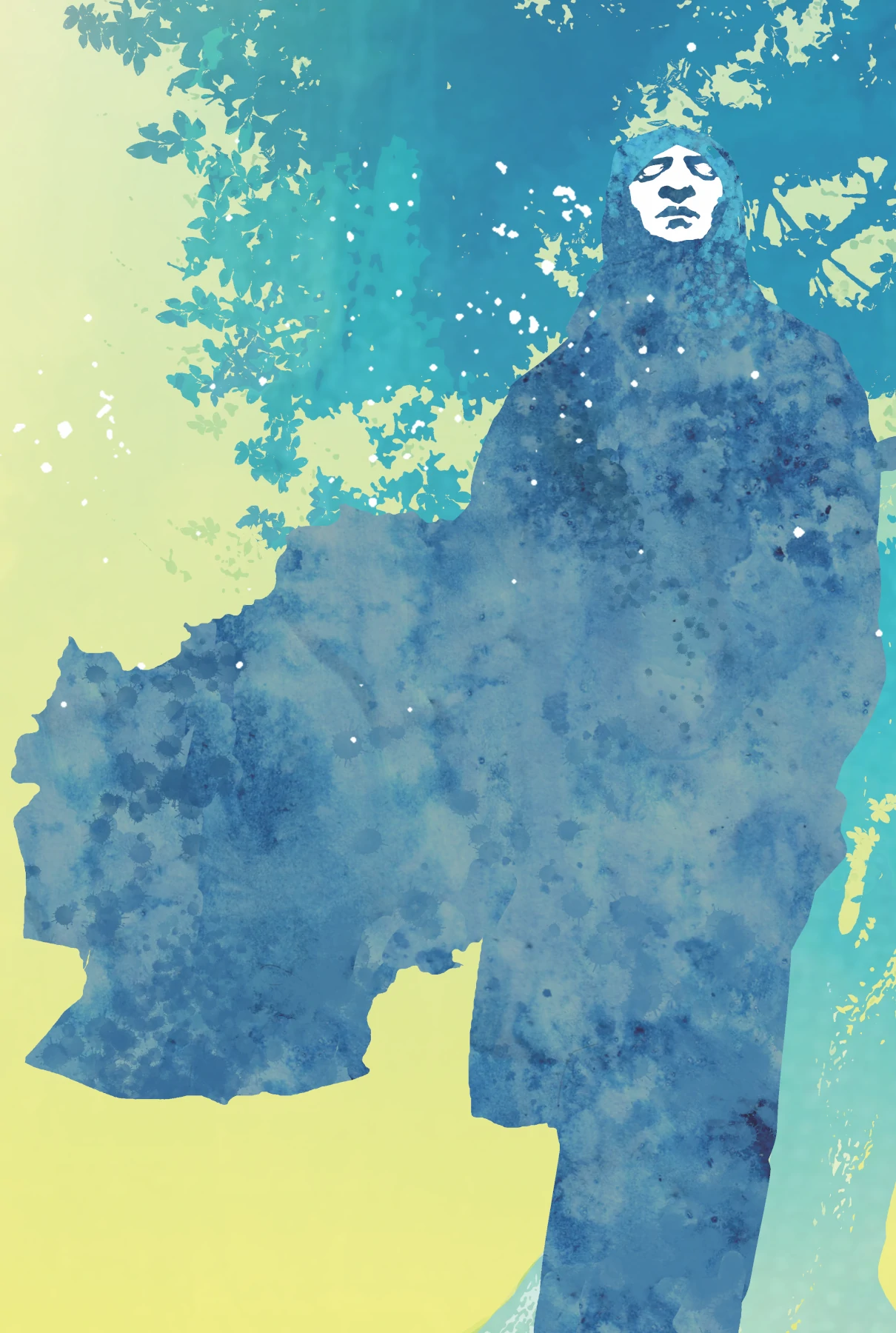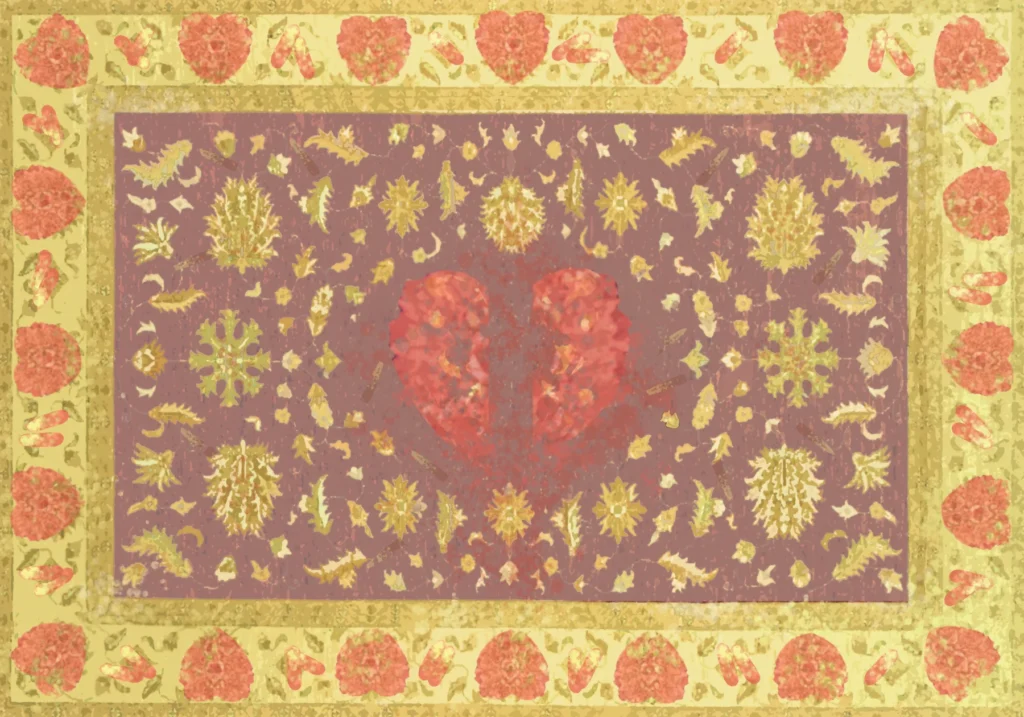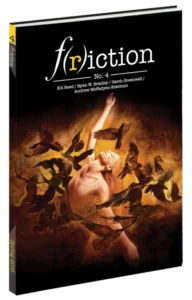
Letters from Afghanistan: A feature from the Afghan Women’s Writing Project
Words By Hajar, Art By Neil McClements
Imagine you have a story to tell. It’s a story about hope, loss, tragedy, and courage. It’s your story. Now imagine trying to write this story having grown up in a country where education was denied to you, where telling your story has been criminalized. And then picture writing it in a second language.
The women of the Afghan Women’s Writing Project, some not even teenagers yet, are doing exactly this: fighting to tell their stories. Despite the risks, these developing writers are driven by the need to share their voices.
F(r)iction is proud to present the work of these brave women.
Attachment
by Hajar
Hey there cancer pills—
though you give life and kill my illness
my hair falls out like an angel
descending into a sinful city.
I have nothing left
since locusts attacked the farm
and Uncle became allergic to air pollution
after moving to Kabul.
My indisposed body desires red wine
to pour into a head filled with memories of you.
It wants to burn a cigarette and watch
as such beauty strikes the darkness.
Have you ever wondered about the peaceful
highways where tired taxi drivers rest?
Maybe I am tired...
and you are a glass of bitter black tea
that makes me moan like a wounded insect.
Maybe you are inelegant...
and I am inspiration
making your emotions affordable.
Do you remember that painter?
What a couple he said, a comely combination
of gray and happy colors on his canvas.
You shined neatly
but I was busy thinking
about how to pay for Uncle’s medicines.
The other day Uncle and I bought cheap ripe
peaches
I thought of you with every bite
as the national bank defaulted.
The absolute silence of political history
reminds me of my stupidity—
I want you and nothing more
nothing less.
Since you are my over-the-top edge of the feeling called attachment from which I’ll soon be detaching.

Heartbreak
by Hajar
Her heart breaks
its core vein torn
an eruption of blood
the helplessness of white cells.
Here are her hands holding such pain.
See her tears sliding across the tracks of her face.
There’s the sound of a heart breaking
like flies making love, punishing her ears
annoyed nails declare war
the bomb explodes
into the flavor of his lips
Red Bull in mouths, she loses again.
Covered in a blanket
hiding her eyes from the lamp—
its grin, a shameful white.
When her heart rips apart
she walks off into a donkey skin.
She add wings to her shoulders
prepares to fly away
and the lamp vomits its brightness
Flowers on wallpaper
become her only friends
and hit her head with petals
the extreme wounds turning their heads
black and blue like hers.
When a woman’s heart crashes
it reminds her of suppressed people’s rights.
Instead she watches the Gandhi film
though justice cannot calm her down
even the end of Mom’s aching moans
Homework won’t save her.
Terrifying failures don’t provoke her.
When people’s hearts shatter they tire of rules throw stones at others’ shoes.
When the impoverished heart
wears out
no one blames capitalism.
When the feminist’s heart smashes
she doubts the story of a woman who survived
the husband’s knife – the damaged heart
in a southern province.
When the poetry warden’s heart escapes
it travels too far, frightened.
It marries the moon
then dies in the road.
She finds a faithful dog’s spirit
in thoughts of a gentleman’s shirt
and some white flowers
from where no one ever dared to go.
She realizes her heart is a copy of herself:
Homeless, hollow, unlucky
dreaming of a shelf
in a safe room to rest.
A true love may come
if time does not preserve her future
risking messages
on Facebook profiles.
Two smart sentences, a smart IQ
those are her dreams of him
along with a sexy dress to wear
Like seaweed floating on the water’s surface
greedy pieces of her heart reassemble to one another
in a hope shop; she bought something to
feed a love so no one will mind.
She googles: Why are so many hearts broken? Each reason resembling the next and the next She adds the faithful dog spirit to her own quiet heart: Oh look! A suit and a wedding dress— in the closet of her imagination.

Daydreaming
by Hajar
Lying carelessly on my unmade bed
I lost consciousness for a time
Immersed in daydreams
I forgot my unbearable being
In a society of lost dreams
Where visions easily fade away
Replaced with duties, to take care of others.
I gazed on the title of a book about someone
I had tried so hard to imitate.
I swallowed all the words
Sending them to remote corners of my brain.
Witnessed a vision of myself
Lying carelessly on the bed.
Drifting away to a strange new country
Where the mornings are blank
In a place I don’t belong
And sunrise will not awaken me.
The spin of life, too short,
Without dreams is like empty
Pants pockets in a shop
Money gone, spent on unnecessary things
Dreams gone, nothing to live for
Life over, too soon.
Yet my heart longs for a dream
To swirl and spin me away
From the world where I am living.
The shape of this book inspires me
To not fear the disgrace of my dream
But to find release in success.
Suddenly my body shakes ruthlessly My daydream ends. But I have found a place To dream my dreams In an unmade bed As sunshine travels off to sleep.

AWWP Author Q&A: Hajar

This is a beautiful collection of poems, Hajar. Can you tell me a little bit about what inspires you to write?

I started writing after my mother passed away in February 2014. Initially, writing was my way of mourning. I began to write about my surroundings: the injustice women face in my country, political issues, corruption, and my everyday life as a woman in a country which is named the worst for women.
There are so many taboos in Afghanistan which require you to act in a way that doesn’t harm your reputation. By writing, I create a completely different world where no one can tell me what or what not to do. As a writer, I have the freedom to decide for myself. When I was a child, I began to notice that the reality of people is covered, and that you needed time and energy to dig that out. I hated that. I wanted to be simple. In my writing, I have nothing to hide. To express what I crave to be is my inspiration when I open my notebook.

Your writing is very personal and introspective. How did you develop this style of writing? Why do you choose to write this way?

I like to write in a way that my subjects are interchangeable depending on the reader’s situation. However, I want my writing to be solid enough to transfer my point of view. I want my reader to feel like they are in my place, so I provide them a key to enter to my world.
Writing, like all other skills, gets better with practice. Reading the work of other great poets influenced me to adopt this form of writing. I choose this way because I want my poems to be real and alive, and I want to advocate my thoughts through them. I believe writers are so closely involved in bringing change that it’s their responsibility to notice the things that people don’t normally see. According to the old proverb, you have to lose something to gain something else. Perhaps, therefore, I sacrifice the blood of my personal stories to grant life to my writing.

What do you hope that American and other Western readers will learn from your writing? What do you hope to help other people understand through your work?

I want Westerners to know that we are trying to bring change. We do raise our voices. We do go out on the street and ask for justice. We want peace. We love everyone, and we are tired of war.
I want people to read my work and learn that although I am a woman far away in a war-torn zone, I worry about the things a normal woman worries about. I challenge myself like any Western woman does. I go to work, despite the obstacles. I talk to people. I expand my network. I want to have a career, and I am fighting for it. I want to have children one day. I want to have someone to trust. Ultimately, I am no different than any other woman a thousand miles away.

In your experience, how does writing help you to deal with the challenges of life as an Afghan woman?

Writing helps me to overcome so many challenges and issues I face as an Afghan woman. As mentioned earlier, creating a world often seems like the only solution to skip the daily sorrows of poverty, inequality, and harassment, not to mention war and suicide explosions.
When I write, no one else has power over me to dominate me in one form or another. I assume writing plays the same role for everyone. Sometimes, I find communication difficult. I cannot talk about so many things, but I can easily write about them. No one judges me. This fact helps me to deal with problems. It also helps me to fight my depression. I can say I am healthier ever since I began to write.

What are your goals for the future? Do you believe that writing has had an impact on those goals?

I want to devote my life to writing. Writing is how I acquire peace. I want to become a professional writer and publish my work, write op-ed for major media, write screenplays for films. I feel every opinion and form of writing is as beautiful as others. I want to explore my writing skills in different forms and themes.
I also think there are so many people out there who are dreaming to hear us. I want to find them and deliver to them what they are searching for. I want to see an Afghanistan where people young and old, women and men read. I dream big, and I have noticed that. But I want to be in my countrymen’s bookshelves one day, in each and every library of Kabul. This is my future goal—though perhaps unrealistic, through my writing, I can picture such a day.
